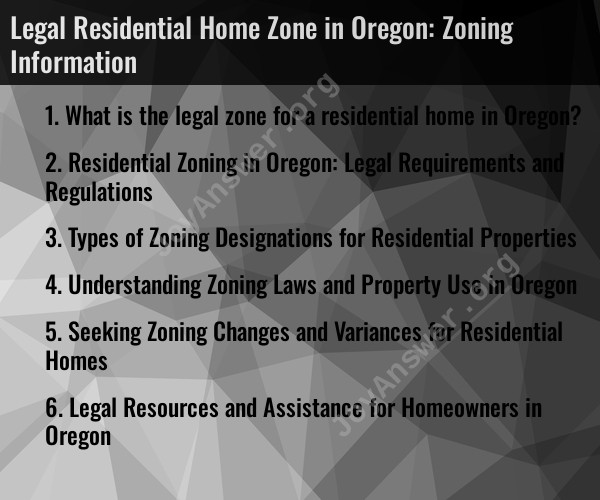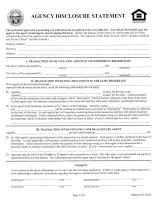What is the legal zone for a residential home in Oregon?
The specific zoning regulations for a residential home in Oregon can vary depending on the city or county in which the property is located. Zoning regulations are typically determined at the local level, so they can differ from one jurisdiction to another. These regulations dictate how properties within a particular area can be used, developed, and what types of structures are allowed.
In Oregon, like in many states, you'll find different types of residential zones, which can include:
Single-Family Residential (R-1): This zone is typically designated for single-family homes and may have specific regulations related to lot size, setbacks, and building height.
Multi-Family Residential (R-2, R-3, etc.): These zones are for multi-unit residential developments, such as duplexes, apartments, or townhomes. The specific regulations may vary between R-2, R-3, and so on.
Mixed-Use Residential: Some areas may allow for mixed-use zoning, where residential and commercial properties can coexist.
Rural Residential: In rural areas, there may be zoning designations for residential properties that have larger lot sizes and may permit agricultural or other land uses.
Historic Residential: In historic districts, there might be special zoning regulations to preserve the historical character of the neighborhood.
Estate or Large Lot Residential: In certain areas, you may find estate zoning, which typically allows for larger homes on more extensive lots.
To determine the specific zoning regulations for a residential property in Oregon, you will need to contact the local planning or zoning department for the city or county in which the property is located. They can provide you with information on the zoning designation, as well as details about what is allowed and any specific requirements for that zone.
It's important to consult with local authorities because they can inform you about any recent changes to zoning laws, permits, or restrictions that may apply to your specific property. Understanding the zoning regulations is crucial when you're planning to purchase or develop a residential property in Oregon.
Residential Zoning in Oregon: Legal Requirements and Regulations
Residential zoning in Oregon is regulated by state and local governments. The Oregon Department of Land Conservation and Development (DLCD) establishes statewide zoning guidelines, but each city and county has its own zoning ordinance.
The purpose of residential zoning is to protect property values, ensure public health and safety, and promote a livable and sustainable community. Residential zoning laws typically regulate the type of housing that can be built in a particular area, as well as the density and size of housing units.
Types of Zoning Designations for Residential Properties
There are a variety of residential zoning designations in Oregon. Some of the most common include:
- Single-family residential: This zoning designation allows for single-family homes, such as detached houses, duplexes, and triplexes.
- Multi-family residential: This zoning designation allows for multi-family housing, such as apartments, condominiums, and townhouses.
- Mobile home park: This zoning designation allows for mobile homes and manufactured housing.
- Rural residential: This zoning designation allows for homes on large parcels of land, typically in rural areas.
Understanding Zoning Laws and Property Use in Oregon
Homeowners in Oregon should understand the zoning laws that apply to their property. This can be done by reviewing the zoning map for their city or county. Zoning maps are typically available online or at the city or county planning office.
Zoning laws can be complex, so it is important to consult with a qualified professional if you have any questions about how your property can be used. A professional can help you determine the zoning designation for your property and advise you on any necessary permits or approvals.
Seeking Zoning Changes and Variances for Residential Homes
Homeowners in Oregon may request a zoning change or variance if they want to use their property in a way that is not allowed by the current zoning designation. A zoning change is a permanent change to the zoning designation for a property. A variance is a temporary exception to a zoning law.
To request a zoning change or variance, homeowners must submit an application to the city or county planning commission. The planning commission will hold a public hearing to consider the request and make a recommendation to the city council or county board of commissioners. The city council or county board of commissioners will make the final decision on whether to grant the zoning change or variance.
Legal Resources and Assistance for Homeowners in Oregon
Homeowners in Oregon can find legal resources and assistance on zoning laws from a variety of sources, including:
- The Oregon Department of Land Conservation and Development (DLCD): The DLCD provides information and resources on zoning laws and other land use planning issues.
- The Oregon State Bar: The Oregon State Bar maintains a directory of lawyers who specialize in land use law.
- The Oregon Housing and Community Services Department: The Oregon Housing and Community Services Department provides assistance to low- and moderate-income homeowners.
Homeowners can also contact their city or county planning department for information and assistance on zoning laws.













